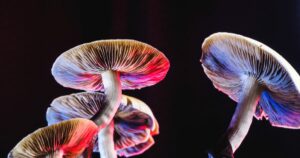Notable Elements
Microdosing Psilocybin for Focus: Exploring Reality and Myth
- Microdosing involves consuming tiny amounts of psilocybin, with claims of improved focus and cognitive benefits.
Potential Pathways to Enhanced Focus
- Theoretical models suggest increased neuroplasticity and improved blood flow as potential mechanisms for enhanced focus.
Reality Check on Microdosing
- Scientific understanding is in its infancy, with limited and inconclusive research on psilocybin’s impact on focus.
Addressing Risks and Concerns
- Acknowledge potential downsides, including anxiety and altered perceptions, and emphasize responsible sourcing and dosage practices.
Responsible Usage Guidelines
- Thorough research, open communication with healthcare professionals, mental health assessment, and harm reduction practices are crucial.
Myth vs. Reality: The Gray Area
- Current evidence falls short of providing a definitive answer on microdosing’s impact on focus, requiring more robust scientific studies.
Navigating the Legal Landscape in Canada
- Psilocybin is illegal in Canada, and ethical considerations surround the reported benefits of microdosing.
The Road Ahead: Ongoing Research
- Ongoing research holds the key to unlocking the true potential of microdosing, emphasizing responsible exploration and informed decision-making.
Introduction
The internet buzzes with claims about the transformative powers of microdosing psilocybin, the active compound in magic mushrooms.

In today’s fast-paced, information-saturated world, enhanced focus and cognitive performance hold appeal. But is this a reality waiting to be embraced, or simply another unsubstantiated myth fueled by desires?
Let us burst the bubble for microdosing and focus, sifting through anecdotal evidence, scientific research, and potential risks for a balanced picture.
Challenges and Tentative Steps
Microdosing involves consuming minuscule doses of psilocybin, typically measured in micrograms, aiming for subtle shifts in perception and cognition rather than full-blown psychedelic experiences. This practice enjoys growing popularity, with individuals reporting benefits ranging from improved mood and creativity to enhanced problem-solving and focus.
The claim of improved focus finds particular resonance in our society obsessed with productivity and optimization. Microdosers stories experiencing laser-sharp concentration, heightened flow states, and effortless learning. Even celebrities and Silicon Valley entrepreneurs have chimed in, lending voice to the anecdotal chorus.
Potential Pathways to Enhanced Focus
The mechanisms behind these reported benefits remain speculative. Some theories suggest microdosing increases neuroplasticity, the brain’s ability to form new connections, leading to improved learning and cognitive flexibility. Others propose it enhances blood flow to brain regions, boosting mental clarity and focus. Additionally, microdosing might indirectly improve focus by reducing anxiety and negative thought patterns known to be detrimental to concentration.
However, it’s crucial to remember that these mechanisms are based on theoretical models and preliminary research, not conclusive evidence.
Reality Check

While captivating anecdotes abound, the scientific understanding of microdosing and its effects on focus remains in its infancy. Existing research suffers from limitations like small sample sizes, short durations, and self-reported data, making it difficult to draw definitive conclusions. Furthermore, studies examining the specific impact on focus are scarce, further clouding the picture.
Despite these limitations, some studies hint at potential benefits. A 2018 study published in Psychopharmacology found that microdosing LSD, another psychedelic, led to improved performance on cognitive tasks measuring problem-solving and divergent thinking. However, it’s important to note that LSD isn’t identical to psilocybin, and further research focusing on psilocybin and focus is necessary.
Addressing Risks and Concerns
While the potential benefits of microdosing deserve exploration, it’s crucial to acknowledge the associated risks and potential downsides. Microdosing is not without its challenges, and individual experiences can vary widely. Some individuals report bad effects like anxiety, paranoia, and altered perceptions, even at low doses. It’s important to remember that psychedelics, even in microdoses, can interact with underlying mental health conditions or medications, potentially leading to adverse reactions.
Additionally, responsible sourcing and dosage practices are paramount. Illegality in many regions means obtaining psilocybin can be risky, and self-experimentation without proper guidance can be dangerous. Individuals with a history of mental health challenges should exercise extreme caution and consider seeking professional support before considering microdosing.
ALSO READ – Top 10 Medicinal Mushrooms and How They Can Enhance Your Health
Responsible Usage
Given the legal gray area and potential risks, Canadians considering microdosing for focus should tread cautiously and make informed decisions. Here’s your roadmap:
1. Thorough Research
Seek credible Canadian and international sources on microdosing, its legality, risks, and potential benefits. Remember, the available evidence is not definitive.
2. Open Communication with Healthcare Professionals
Discuss your interest with a healthcare professional familiar with psychedelics, considering their expertise and potential biases.
3. Prioritize Mental Health Assessment
If considering microdosing, ensure you have a healthy mental state and seek professional assessment for any pre-existing conditions.
4. Harm Reduction Practices
If you proceed, prioritize harm reduction. Have safe sourcing practices, proper dosage, and potential interactions with medications. Remember, self-experimentation is risky, and get professional guidance.
Myth vs. Reality: Where Do We Stand?
So, where does this leave us? Microdosing for focus currently resides in a gray area. While anecdotal evidence and some preliminary research suggest potential benefits, the lack of robust scientific studies leaves definitive answers elusive. More research is urgently needed to understand the true impact of microdosing on focus, considering both potential benefits and risks.
The current status of microdosing as a myth or reality is irresponsible. It’s more accurate to say that the jury is still out, and the current evidence falls short of providing a definitive answer.
Navigating
Given the current knowledge, individuals considering microdosing for focus should proceed with caution and critical thinking. Thoroughly research the potential risks and benefits, consult with healthcare professionals, and consider seeking guidance from mental health specialists with expertise in psychedelic-assisted therapies. Remember, responsible sourcing and individual risk assessment are crucial.
Canadian Legal Hurdles
While not legal for recreational use, a growing Canadian interest in microdosing exists. Some report experiencing better focus, creativity, and even relief from anxiety and depression. However, navigating this territory requires understanding the legal and ethical complexities.
1. Current legal status
Psilocybin and psilocybin-containing mushrooms remain Schedule III controlled substances in Canada, making possession, production, and distribution illegal. However, ongoing research and potential therapeutic applications have sparked discussions about decriminalization and regulated access for medical purposes.
2. Ethical considerations
Given the legal status and limited research, address ethical concerns. Self-experimentation without proper guidance can be risky, and individuals with pre-existing mental health conditions require thorough assessments.
The Road Ahead
The microdosing’s potential continues, with ongoing research holding the key to unlocking its true potential. As the scientific landscape evolves, it’s vital to follow reputable sources, critically evaluate emerging information, and avoid jumping to conclusions based on personal anecdotes or isolated studies.
Microdosing and its impact on focus is a complex and nuanced issue. While the whispers of enhanced cognitive performance might be alluring, it’s crucial to remember that the path forward requires responsible exploration, critical thinking, and a clear understanding of the potential risks involved.
The only way to move beyond possibility is through comprehensive research and informed decision-making.

Hi! I’m Jacob Hawthorne, a passionate medical student dedicated to exploring the fascinating world of psychedelics, particularly magic mushrooms (commonly known as shrooms). With a deep interest in their therapeutic potential and profound effects on the human mind, I aim to provide accurate and evidence-based information about shrooms in the Canadian context.

